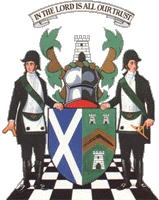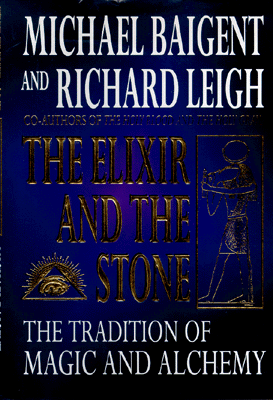
|
Review
| 
|
The Elixir and the Stone.
The Elixir and the Stone. The Tradition of Magic and Alchemy. By Michael Baigent and Richard Leigh. Published by Viking (the Penguin Group), 1997. Hardback. ISBN: 0-670-86218-5.
In this latest of their books, Michael Baigent and Richard Leigh have been successful in an ambitious project, that of tracing the development of modern Western philosophy from its early beginning. They have, in particular, shown the effects on our thought, and therefore on our history, of Hermeticism, that system of philosophy which flourished in Alexandria two thousand years ago, tracing its developments through its principal exponents down the centuries.
 They have shown that the gradual development of the Faustian legend was the natural result of the influence of Hermetic thought on an advancing civilisation, their hypotheses having been deduced after wide research. For the serious scholar, they have appended an extensive bibliography accompanied by explanatory notes.
They have shown that the gradual development of the Faustian legend was the natural result of the influence of Hermetic thought on an advancing civilisation, their hypotheses having been deduced after wide research. For the serious scholar, they have appended an extensive bibliography accompanied by explanatory notes.
Some fundamental definitions are required of the reader and it is noticeable that where these are needed the authors have given them.
Nevertheless, the volume is not for the casual reader and it requires a certain dedication from those who would learn from it.
Masonic readers will be disappointed if they expect to receive from the text an explanation of the sources of Masonic philosophy but they will be quick to recognise that some of those sources are present. The book is not aimed specifically at a Masonic readership but it will certainly broaden the thinking devotee's perception of his Craft. The text contains several interesting references to such celebrated Freemasons as Sir Robert Moray and Elias Ashmole, referring to the influence of Hermeticism on their lives.
Several chapters are devoted to individual magi, those teachers and thinkers who advanced their ideas, often in the face of tyrannical prejudice from the ecclesiastical authorities, and the authors explain clearly the harmonious relationship which existed, particularly in Spain, between Christianity and Islam during the Dark Ages.
The writers have given considerable attention to the development of the Faustian legend in the western world, showing that it was a natural result of the heritage of Hermeticism and that with the rapid advancement of scientific knowledge, a revived interest in the occult has grown during the present century.
This volume cannot be described as a book for the casual reader, but to he who believes that the proper study of mankind is man and the influences on him of his surroundings, it will increase his knowledge of himself and of the world.
[This review reproduced from the Grand Lodge Of Scotland Year Book, 1998]
Click HERE to return to the booklist.

Grand Lodge Main Page




 They have shown that the gradual development of the Faustian legend was the natural result of the influence of Hermetic thought on an advancing civilisation, their hypotheses having been deduced after wide research. For the serious scholar, they have appended an extensive bibliography accompanied by explanatory notes.
They have shown that the gradual development of the Faustian legend was the natural result of the influence of Hermetic thought on an advancing civilisation, their hypotheses having been deduced after wide research. For the serious scholar, they have appended an extensive bibliography accompanied by explanatory notes. 